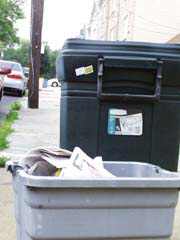Looking to keep Jersey City from becoming an importer of recycling from other communities, the Hudson County Board of Freeholders altered a resolution, setting lower limits on two recycling plants.
Freeholder Bill O’Dea recommended setting a maximum capacity for two recycling sites in Jersey City that would better reflect the actual recorded average daily tonnage as reported by the Jersey City Incinerator Authority.
The original resolution, which had been scheduled to come to a vote before the freeholders at their July 10 regular meeting, would allow the Hudson County Improvement Authority to permit increases in the total tons of recycling materials as well as an expansion of the types of material.
O’Dea agreed that the site should be allowed to expand the types of recycling, but not the amounts.
Reliable Paper Inc. has two sites, one located on Pacific Avenue in Jersey City, the other at Caven Point Road. Reliable is seeking to add metal, plastic and glass at its Pacific Ave. site and white goods (large appliances such as washing machine, clothing dryers etc.) to its Avenue Point Road site. Currently, both sites recycle paper, cardboard and cloth.
Several freeholders were concerned with the increased traffic through city streets if the total tonnage was increased.
O’Dea said Jersey City has a daily average of 140 tons. Reliable is looking for an average of 250 at one site and 150 tons at the other. O’Dea said the figure for both sites should be 160 tons, and that should be a cap, not an average. This would give them a 20-ton per day margin of error for those days when there might be more recyclable material.
“I do not want that site seeking recyclable items from other communities unless the firm comes before us again to ask for an increase,” O’Dea said. “This would allow us to monitor the situation there.”
Freeholder Barry Dugan, however, suggested the freeholders look more closely at the situation and requested more information, citing the company’s need for the higher tonnage in order to make the project profitable.
The outcome of the vote was not available at press time.
Bus service among Secaucus, NB, Hoboken questioned
The freeholders also questioned again a county program that used state and federal funds to provide bus subsidies to New Jersey Transit for service between Hoboken and Secaucus.
Hudson County officials have used the bus route for getting people to jobs in that remote corner of the Hudson County as part of the county’s Welfare to Work program. Malls and hotels in Secaucus as well as warehouses along West Side Avenue in North Bergen provide significant opportunity for employment, provided people can get to them during the specified hours.
Because Bus Route No. 85 had such limited hours, the county initiated a program that would subsidize NJ Transit to broaden the hours and frequency of the bus service.
Two years ago, Hudson County came to an agreement with the state Department of Human Services in conjunction with its Temporary Assistance to Needy Families (TANF) program, then came to an agreement with New Jersey Transit to fund increased hours for the bus. Under this proposal, Hudson County paid the first year $450,000 a year for the service to be run from 10 a.m. to 3 p.m. and 7 to 10 p.m. on weekdays, and 6 a.m. to 10 p.m. on weekends. In the first year of operation, the program provided 9,836 rides per month (or about 300 per day) at the cost of $2.71 per ride.
The cost of the service will increase from $6.3 million to $7.6 million with a total increase in cost to the county budget of about $225,000.
Dugan, who represents Bayonne, noted that areas near the Jersey City-Bayonne border are often just as remote when it comes to public transportation, and yet no similar program exists. He said numerous people are walking across dangerous roads and railroad tracks to get to jobs from the points where regular bus service ends.
Dugan also asked for a better accounting of services provided in the county.
“I would like to know where these buses stop and how many bus stops do they stop at,” he said.
